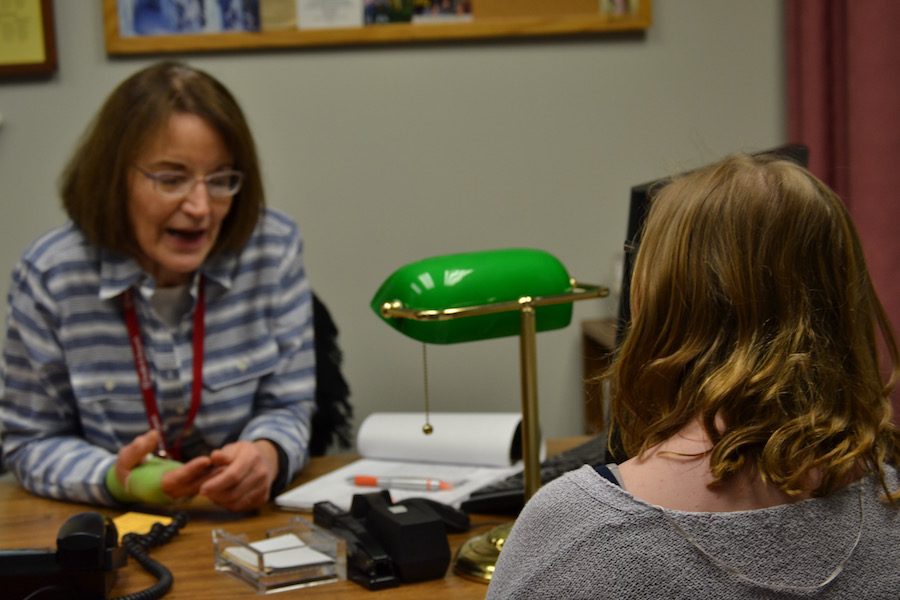Student speaks out about chronic illness
I was nine years old when I was diagnosed with Ulcerative Colitis, a chronic illness that inflames the large intestine and causes diarrhea, pain, bleeding, and other side effects. The worst part of the diagnosis wasn’t the doctors, it wasn’t the hospitals, and it wasn’t the pain. No, the worst part of the experience was the ostracization and rejection from my peers. For a kid growing up with a chronic illness, the social stigma around the disease can be just as damaging as the illness itself.
January 31, 2017
Senior Olivia Rossman talks to health aide Sharon Ingalls about the effect of chronic illnesses on BSM students.
Although it may seem like diseases like mine aren’t necessarily common among children, I’m not the only kid enduring a chronic illness at Benilde-St. Margaret’s. It’s estimated that up to 18% of children are living with some type of chronic illness in the United States. Converting those stats to the roughly 1200 students at BSM, that’s about 216 kids at Benilde alone who suffer from a chronic health condition.
Senior Elyse Vandersteen is open about her battle with type-one diabetes. “I was around five years old when I was diagnosed with my first chronic illness. Since then, there’s never a day when I don’t have to take medicine or go to the nurse. It’s every day,” Vandersteen said.
Chronic illness’ have numerous obvious symptoms, but there are other various consequences that aren’t always apparent. Kids with chronic illnesses miss much more school than their “healthy” counterparts, and they aren’t just missing the coursework. Vandersteen believes that the social stigma around the diseases can be mentally damaging, and the lack of general education on the topic can lead to ignorant comments or actions from peers and faculty alike. “A lot of people don’t get it. Everyone [with a chronic illness] handles it differently, and a lot of people can’t understand that. [I want] to be understood and listened to. Sometimes people feel embarrassed, I try and be responsible and advocate for myself, but it’s hard,” Vandersteen said.
BSM’s Health Aide, Ms. Sharon Ingalls, believes that students don’t want to be different, and that may be the cause of the isolation chronically ill students face. Feeling so different can make it hard for chronically ill kids to connect with their peers. “Everybody just wants to fit in, they don’t want to be different. They don’t want to be seen as having any type of problem,” Ingalls said.
Ingalls believes that she sees approximately 100 students who identified their need for school intervention for chronic illnesses, and she sees about four of those students regularly. However, Ingalls recognizes that there are probably students who don’t report their illnesses. “Some choose not to put that information [on the health report] for various reasons—maybe it’s very well maintained or they choose not to share,” Ingalls said.
Ingalls, however, asserts that she has seen a shift in the chronically ill students that go to her office in recent years. “As [BSM] becomes more aware of chronic health problems and how best to work with students and the families, students themselves are being more assertive about what they need,” Ingalls said.
What chronically ill students need can differ from what the average student would expect. Because students with chronic illness often miss school for extended periods of time, they need to work with the school and their individual teachers to configure lesson plans around the illness. Certain school-day accommodations need to be made, such as unlimited bathroom passes and time-outs from class to rest. While these may seem like perks to the average student, the fact is, most students (including myself) require these accommodations to make it through the day at school. That’s the ultimate goal for most students who live with chronic illness: just make it through the day.

